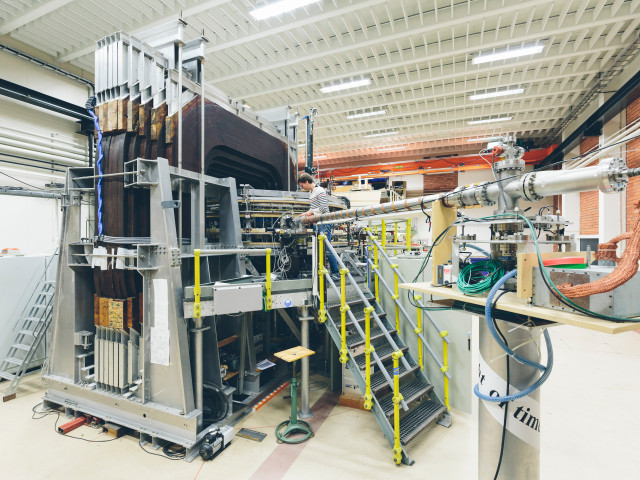The project work consists of an independent work focusing on a specific problem, decided by the examiner. The project should normally be a focused study within the chosen subject area, at advanced level, The project work should correspond to 10 weeks of full time study. The work should be presented in a written report as well as orally at an open seminar.
SH2009 Project work in Physics, Smaller Course 15.0 credits

Information per course offering
Choose semester and course offering to see current information and more about the course, such as course syllabus, study period, and application information.
Information for Spring 2026 Start 13 Jan 2026 programme students
- Course location
AlbaNova
- Duration
- 13 Jan 2026 - 1 Jun 2026
- Periods
Spring 2026: P4 (7.5 hp), P3 (7.5 hp)
- Pace of study
50%
- Application code
61086
- Form of study
Normal Daytime
- Language of instruction
English
- Course memo
- Course memo is not published
- Number of places
Places are not limited
- Target group
- No information inserted
- Planned modular schedule
- [object Object]
- Schedule
- Schedule is not published
- Part of programme
- No information inserted
Contact
Course syllabus as PDF
Please note: all information from the Course syllabus is available on this page in an accessible format.
Course syllabus SH2009 (Spring 2018–)Content and learning outcomes
Course contents
Intended learning outcomes
- Apply knowledge and skills acquired in the subject area in order to solve a specified project task.
- Within the given framework, independently analyze and discuss complex questions and handle larger problems at an advanced level within the subject area.
- Reflect on, evaluate, and critically review and compare his/her own others scientific results.
- Document and present the work, for a given audience, with high demands on structure, form, and language, both orally and in writing.
- Identify the need for acquiring additional knowledge and continously develop his/her skill set.
Literature and preparations
Specific prerequisites
As a general rule, the majority of the study programme should be finished before the project work is started. The examiner should make sure that the individual student has a suitable subject background and that the student has finished a sufficient part of the study programme before starting the project.
Recommended prerequisites
The majority of the study programme should be finished before the project work is started.
Literature
The student is expected to be independent in finding and studying relevant litterature in the subject field. Litterature can also be recommended by the supervisor.
Examination and completion
Grading scale
Examination
- PRO1 - Projects, 15.0 credits, grading scale: P, F
Based on recommendation from KTH’s coordinator for disabilities, the examiner will decide how to adapt an examination for students with documented disability.
The examiner may apply another examination format when re-examining individual students.
If the course is discontinued, students may request to be examined during the following two academic years.
The project work should be performed individually or, in exceptional cases, together with another student. In the case with two students, separate individual tasks within the project should be well defined and the examiner should make sure that the partition and interface between the students is realistic, and that the work for each student correpsonds to the proper requirements. The work should be presented individually, both orally and in writing, in English or Swedish. Depending on the study programme of the student, opposition of another project work could be required to fulfill the criteria for passing the project course.
The project work will be evaluated according to the criteria below, within the evaluation areas process, scientific content, and presentation. The P/F grade is decided by the examiner as an overall assessment after a check for plagiarism has been performed of the written report. For passing the project work course, none of the three evaluation areas can be failed.
A student who has not finished the project work withing twelve months run the risk of failing the course. Such a decision is taken in consultation between the examiner and the programme coordinator.
Other requirements for final grade
**Process
**PassedPlan and implement the work within the agreed time frames, show power of initiative, be open for supervision and critisism, be able to acquire new knowledge, show ability in understading other's work, and formulate relevant critisism.
Failed
Lacking respect for agreements, considerable lack of independence or disobedience in supervision. Inabaility or unwillingness to acquire new knowledge.
**Scientific content
**PassedFrom the problem at hand, and with a relevant methodology, show a good ability to, in a systematic way, apply engineering- and scientific skills in formulating the problem, modelling, analysis, development, and evaluation. When it is relevant for the problem at hand show awareness of social and ethical aspects, including economical-, social-, and ecologically sustainable development.
Failed
Major shortcomings in engineering- and scientific skills, or considerably lacking methodology despite requests.
Presentation
Passed
Present a well disposed report, with a clear presentation of the work and the results, an analysis and argumentation, as well as good language and form. Show a good ability to orally present and discuss the work.
Failed
Remaining shortcomings in the written report despite requests, or considerable inability to orally present or discuss the work.
Examiner
Ethical approach
- All members of a group are responsible for the group's work.
- In any assessment, every student shall honestly disclose any help received and sources used.
- In an oral assessment, every student shall be able to present and answer questions about the entire assignment and solution.